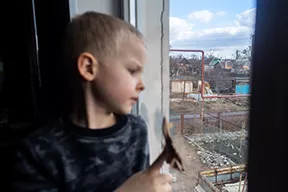Social Work in a Time of War
A GSSWSR-led webinar series connected Ukrainian social workers with expertise—and each other.
Russia’s ongoing war on Ukraine is taking a heavy toll on Ukraine’s mental health workers. Recognizing the need for support, the GSSWSR last summer launched a webinar series designed specifically for Ukrainian social workers.
The genesis of the program, explains Professor Emeritus Jim Martin, was the arrival on campus of Ukrainian scholar Nataliia Gusak as a faculty fellow. Martin, who had come to know Gusak as part of an international collaboration on military and veteran social work, worked with the Provost’s Office to bring Gusak here early in the war. Martin and Gusak soon began talking about how they could support Ukraine.
Associate Professor of Social Work Cindy Sousa, who joined Martin and Gusak to develop the webinar series, says there was an obvious fit with the GSSWSR’s focus on trauma, recovery, and resilience and the College’s values as an institution. “It’s so important within social work and at Bryn Mawr that we think about using our professional standing to engage globally in issues of peace and social justice,” Sousa says.
For the summer 2022 series, which was organized around themes such as ambiguous loss and trauma at different life stages, the GSSWSR team received applications from more than 400 social workers in Ukraine, from which they selected 30 participants. A second series offered in the fall was equally popular.
Each member of the BMC team brought different areas of expertise, with Gusak focusing on resilience and coping; Sousa on family well-being during war and armed conflict; and Martin on trauma, grief, and loss.
Social work as a profession is relatively new in Ukraine and lacks infrastructure, says Martin. “And now, it is being overloaded with the demands of a war that affects everybody,” he says. “They don’t have the scaffolding to support what they’re currently experiencing.”
On top of that, says Gusak, the social workers are themselves experiencing trauma and grieving. “They cannot support their own families well because they have so many clients and people to help,” she says. “One thing we talked about was self-care—how important and valuable it is to take care of themselves during this war. They cannot do their work if they do not care about themselves.”
The theme of self-care became particularly important during the second series in the fall, as war fatigue began to settle in and the social workers felt ever more isolated and overwhelmed.
“The first and second groups were completely different because of where they were in the timeline of the war,” says Gusak. “The first group was mobilized and active—they were in the heroic phase.”
The second group, after months of wartime challenges, were “just so much more isolated,” says Sousa. “They were disconnected from each other, they had hardly any internet, and they had no extra time to connect with their colleagues or get support for themselves.” This made the professional solidarity and sense of community provided by the webinar group that much more vital.
The team has now shared recordings of the presentations with a wide group of social workers in Ukraine and is pondering next steps and ways to partner with other groups doing similar work, including the University of Southern California and the Center for Traumatic Stress.
Recently, Gusak and Martin were invited to participate in meetings with executives at Sesame Street, where plans are afoot to translate some of the episodes into Ukrainian, focusing on topics like military injuries and helping children understand issues around loss.
Martin, who was struck by how “eager and hungry” his Ukrainian peers are for information, ideas, and support, says the team is committed to staying involved for the long haul and is talking about what format future sessions might take.
Published on: 06/08/2023
